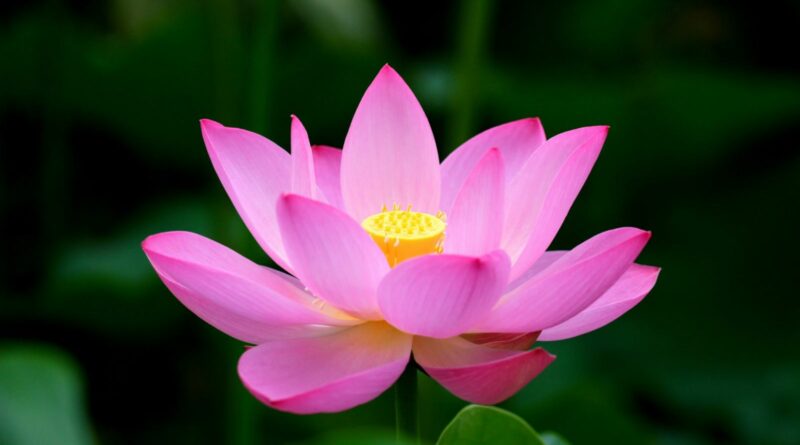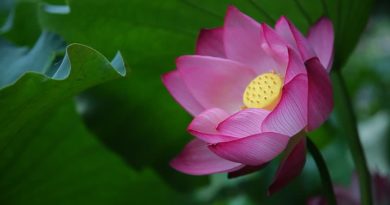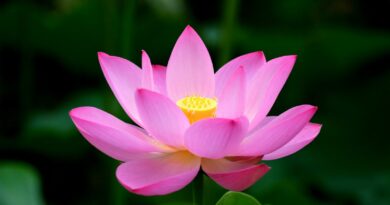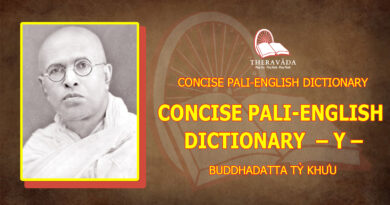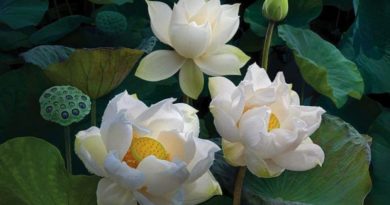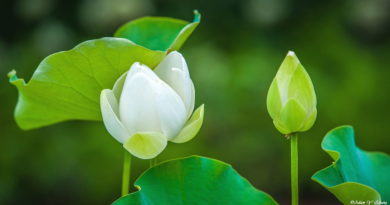Answers By Mr. S. N. Goenka: Noble Truths
-Could you say a little about the four noble truths?
Mr. S. N. Goenka: Again, these are so universal. Nobody can deny the first noble truth, the reality of suffering. Association with undesirables [undesirable objects, people, situations] and disassociation from desirables brings suffering. So the first noble truth, the truth of suffering or misery, is universal. The second noble truth, the cause of misery, looks different from the inside than from the outside. It seems that I am miserable because something happened outside that I didn’t want to happen, or something didn’t happen according to my wishes. But deep inside, everyone can realize that the misery I am suffering is caused by my reaction of craving or aversion. I like something, and I generate craving. I dislike something, and I generate aversion. This second noble truth is common to all.
So, too, the way to come out of misery is common to all, because you have to eradicate the root of your misery, where craving and aversion start. At a gross level, a good way to do that is to practice sīla—that is, don’t perform any action, physical or verbal, that will disturb or harm other beings, because simultaneously it will harm you. Then work with samādhi; control your mind. But mere control is not sufficient; you must go deep and purify your mind. Once it is purified, craving and aversion are gone, and you have reached the stage where there is no misery at all. It’s all so scientific; people accept it so easily. Of course, if we keep fighting over dogma, difficulties arise. But I say, just practice and see: Are you suffering or not? Isn’t this the cause of the suffering? And isn’t it eradicated by practicing in this way?
-Perhaps at the intellectual level, one can come to understand this reasoning about the Four Noble Truths, but how is it possible to explain, in a way that is understandable for the common person, that life is suffering and that the practical realization of this Noble Truth can lead to freedom from suffering?
Mr. S. N. Goenka: This is dukkha – this is a universally bitter truth which cannot be eliminated by ignoring it or by turning away from it. We cannot close our eyes to it and wish it away. We cannot make it go by any speculation or argument. To accept the reality of dukkha is to accept the truth. When we accept the truth of dukkha, only then can we seek a way to come out of it.
Can there be any impediment to accepting the truth of dukkha? How evident is this truth, how clear is this fact? How the lives of all living beings are infused with dukkha! We cannot even imagine how great is the suffering of all sentient beings. In this tiny span of time while I am engaged in speaking these sentences, on this earth countless smaller beings are being devoured and crushed in bloody jaws; they are being ruthlessly swallowed without any pity. Can we ever measure their agony, their pain, their dukkha?
Even if we leave aside the suffering of the sentient beings of the animal kingdom, how immeasurable and limitless is the dukkha of man alone? In this one moment of existence, how many sick people in the hospitals of the world are groaning in agony? How many, having sensed impending death, are crying in vain, in fear and anguish? How many, at the loss of their wealth, prestige, their position, their power, are beset at this moment with pain? Who can have any reason for not accepting the truth of suffering while living in this universe where there is suffering everywhere?
We certainly do not wish to say that in life there is only dukkha and not a vestige of any pleasure. But are the pleasures of the senses really something that can be called happiness? Does not that glitter of happiness contain within it the shadow of pain? There is no sensual pleasure which is permanent, unchanging, everlasting. There is not a single pleasure in the sensual sphere which one can enjoy with satisfaction forever. All pleasures are impermanent, are changing, must come to an end. Whatever is impermanent is unsatisfactory, after all. When we get attached to something because it seems pleasurable to us, how great is the sorrow when that pleasure is no more; the pain becomes intense.
In the eyes of the world, a person may be considered very happy or even consider himself very happy. How long do people enjoy such pleasures? How quickly does the momentary brightness turn to darkness! As much as a person gets involved in and attached to these pleasures, to the same degree he involves himself in inevitable suffering. But one who enjoys pleasantness with detachment – clearly understanding its impermanent nature – is always safe from the suffering when pleasure ends. Therefore, while enjoying these pleasures, if we are aware of their changing, impermanent nature, if we are aware of the inherent dukkha in them, then we remain free of the pain that comes along when these pleasures end. To see dukkha in our pleasures is to see the truth which destroys dukkha; this is a righteous way of life which ensures our well-being.
The purpose of seeing the truth of dukkha is that as soon as the dukkha raises its head, we see it, we apprehend it, and at once extinguish the fire of this dukkha so it cannot spread. If we are aware of the dukkha involved in attachment to pleasure, then we will not allow the fire to spread. While enjoying the pleasure, we will tend not to get tense or excited, and when the pleasure ends, even then we won’t become miserable, because all along we have understood the ephemeral nature of pleasure. So, the ceasing of the pleasure does not necessarily become a cause for suffering.
Everyone, without any exception, experiences some of the truth of suffering, but it is only when the suffering is experienced and observed objectively, rather than indulged in, that the truth of it becomes beneficial. Then it becomes a Noble Truth. To cry, to whimper, to writhe in pain because of some physical suffering is, no doubt, seeing the truth of suffering, but to observe and understand the suffering underlying the apparent enjoyment of boisterous laughter, wine and song is to really see the Noble Truth of suffering.
As long as we are unable to observe the real nature of sense pleasures, we shall continue to cling to them, we shall continue to yearn for them-and this is, after all, the main cause of all our suffering.
So, if we are to fully understand, fully comprehend dukkha, then we have to understand and consider the subtle reality. At the level of experience, within the framework of one’s own body, one observes the transitory, impermanent nature of reality and thus realizes the nature of the entire mind-matter universe. The world of the senses is impermanent, and whatever is impermanent is suffering.
To understand and to observe this reality is to comprehend, to appreciate the First Noble Truth; and it is this understanding of the Noble Truth of suffering which can take us toward freedom from all suffering.
-Let me ask you about suffering. What about children who are in great physical pain? They have no control over their suffering
Mr. S. N. Goenka: Parents are responsible for the joy, happiness, or misery of the child, at the initial stage. They need to give them a good atmosphere. If the parents are agitated all the time, quarreling, feeling anger, hatred, this, that, then the whole atmosphere of the family is such that the child cannot experience what real happiness is.
At present, there are so many different kinds of exploitation going on, so people are hesitant about every kind of meditation, whatever it is. But in a few years time, when more and more people start experiencing it, then this will become a part of the life of the society. Now we have our schools, colleges, gymnasiums, hospitals—these are necessary for the society. In the same way Vipassana centers will become necessary for the society. The children will go to these centers—not necessarily for ten days. They will just start by observing their respiration for few minutes. It will become a part of their teaching in the school.
In India, there is a school period which is called P.T., “physical training.” I say, why not also have “M.T.,” a few minutes of mental training? Ten minutes is enough, and the whole day works much better. Some of the schools have started this and are getting very good results. This will become very popular; it is bound to happen. Some people take it as a religion, a cult, or a dogma, so naturally there is resentment and opposition. But Vipassana should only be taken as pure science, the science of mind and matter, and a pure exercise for the mind to keep it healthy. What could be the objection? And it is so result-oriented, because it starts giving results here and now. People will start accepting this.
There are always initial difficulties—when a Vipassana center is started, the neighbors might say, “Oh, who are these people, what are they going to do here?” But after one, two, three years, they find it is something so good, it helps them also. Some of them will come and participate, and the word will start spreading. It has happened this way at every center. The initial year, there is a little turmoil. The second and third year, the neighbors start cooperating. It’s bound to spread.
-In face of these situations which we encounter daily, what is the way to end the suffering and agitation that is in us?
Mr. S. N. Goenka: If a thing arises due to a certain cause, it can certainly be eradicated by eradicating the cause. Suffering, we have seen, arises because of craving and aversion. If these are completely eliminated, then as a matter of course, suffering will also be eliminated.
It is easy to accept this truth at the theoretical level but so difficult to realize it at the experiential level. And unless one experiences in practice the eradication of the causes, the resultant end of suffering can never be attained. A truly liberated person does not merely expound the theory of the eradication of suffering; he shows the way to achieve this end. Thus, the way to come out of misery is essentially practical, not merely theoretical.
To eradicate the sources of suffering-craving and aversion-one must know how and where they arise. Through personal experience, a liberated person discovers and then teaches that they always arise whenever there is a sensation. And a sensation arises whenever there is contact of a sense-object with a sense-door-of material vision with the eyes; of sound with the ears; of odor with the nose; of taste with the tongue; of touch with the body; of thought with the mind.
We must eradicate craving and aversion at their source-that is, where the sensation arises. To do so, we must develop the ability to be aware of all the sensations within the body. For this purpose, we should train our minds to become sharp and sensitive enough to feel the sensations at all levels. Along with this distinct awareness, we must also develop the faculty of maintaining equanimity towards all the sensations-pleasant, unpleasant, and neutral. If we maintain this awareness and equanimity, we will certainly not react; when sensation arises, one will not again generate craving or aversion.
-Many people today are embracing the idea that truths are multiple—that there are many different kinds of truth, that truth is something created by humans and that there is no one ultimate truth. Yet Vipassana, as I understand it, seems to point toward an understanding of truth as something absolute. From the perspective of Vipassana, what is truth?
Mr. S. N. Goenka: You are quite correct when you say that, generally, human beings have created truth. Different people have different views. Human beings are intellectual beings, and at the level of intellect—reasoning, logic—someone will say, “Perhaps this is so. It appears to be so. This seems logical.” Someone else will say, “No, this is not logical, that is logical.” All those perceptions are at the intellectual level, and the intellect has its own limitation—it differs from person to person.
But there are basic laws of the nature: for example, fire burns. What does this have to do with intellect? It is simply the truth. If you put your hand in the fire, it burns. If it does not burn, it is not fire, though it may be something else. This is the law of nature, which can be experienced by one and all. It is not somebody’s intellectual game—it is truth.
Vipassana meditation works with the actual truth, which can be experienced by one and all. Vipassana is not an intellectual game. It is also not an emotional or devotional game. This is another kind of truth that human beings create: “I have great devotion in Buddha, so whatever Buddha says is the truth.” “I have great devotion for Jesus Christ,” and I will say, “Whatever Jesus Christ said is truth.” These are devotional games and they also vary from person to person.
So truths which are based on devotion, or truths which are based on intellect, will always differ. They cannot be the same. But truth based on actual experience will remain the same.
Vipassana gives importance to the actual experience. The truth experienced by each individual is the truth for that person.
Now there are levels of experience; one may not be able to experience a particular truth now. But as one goes deeper inside—experimenting, experimenting, and starts experiencing subtler things, then everyone will experience the same subtle reality at the deeper level. It is not that only a particular gifted person will experience it—the law of nature is the same law for everybody.
Anybody who puts a hand in fire gets burned. Fire won’t discriminate for a Hindu or a Muslim or a Christian or a Jew. The defilements of the mind act the same way: if you generate anger, hatred, ill will, animosity, passion, fear, ego, worry, anxiety—any impurity in the mind—it will make you miserable, it will make everyone miserable. The result is the same for an Indian or a Russian, a European or an American. The law of the nature does not discriminate, does not favor. This is truth, truth eternal—for everybody, all the time, past, present and future.
Similarly, if the mind is free from these defilements—if one does not generate anger and the mind is free from negativity, if the mind is pure—one will notice that the mind becomes full of love, full of compassion and goodwill. These good qualities arise naturally in a pure mind. And when these wholesome qualities are in the mind, one naturally feels very peaceful, very harmonious. Again, this is a law of nature. Whether you are a Muslim or a Hindu or a Christian, makes no difference, white or black or yellow, makes no difference.
Purity of the mind makes us feel very happy, peaceful and harmonious. We may belong to any community, any religion, any sect or none at all. Vipassana is beyond all religions, beyond all sects, beyond all beliefs, beyond all dogmas or cults. It is a pure science of mind and matter—of how they interact, how they keep on influencing and being influenced by each other. This reality is not to be accepted at the intellectual level, not to be accepted at the devotional level; it has to be experienced by each individual.
Suppose I have never experienced the burning of fire. I may have understood it intellectually because others have said, “If you put your hand in fire, it will burn.” But once I have actually put my hand on a fire, and I find that it burns, naturally I will keep my hand away from fire afterwards. In the same way, if we understand intellectually that all these negativities make us unhappy, this is an intellectual under- standing. But when you go deep inside, you can experience this truth for yourself: “Look, anger has arisen, and I have become so agitated. Passion has arisen, I have become so agitated. When any impurity arises, I become so agitated, so irritated, so miserable.” You are experiencing it. And when you experience it directly, the next time you will be more careful not to generate such negativity: “Look, this is like fire. If I generate anger, it burns.
This is not a sermon, there is no a devotion involved: it is a fact, a hard fact of the life. If you defile your mind nature, the law of nature, starts punishing you then and there. It won’t wait until after death and take you to hell. You suffer the pangs of hell now. You become so miserable. Similarly, if you keep your mind pure—full of love, compassion and goodwill, it starts giving the reward here and now. Look, your mind is pure, no negativity: you feel so peaceful, so happy. So simple.
That’s all Vipassana is, just following the law of nature. And by practicing, practicing; experiencing, experiencing, one starts changing the behavior pattern of the mind.
To come out of misery and live a happy life—everyone wants this, but one doesn’t know how to do it. By the practice of Vipassana you go to the depth of your mind—where the actual misery starts because of these negativities, where the actual happiness is experienced because of the absence of these negativities—and once you start experiencing these things for yourself, a change automatically happens in your mind. You live a better life. Everyone lives better life.
Source: https://www.vridhamma.org

